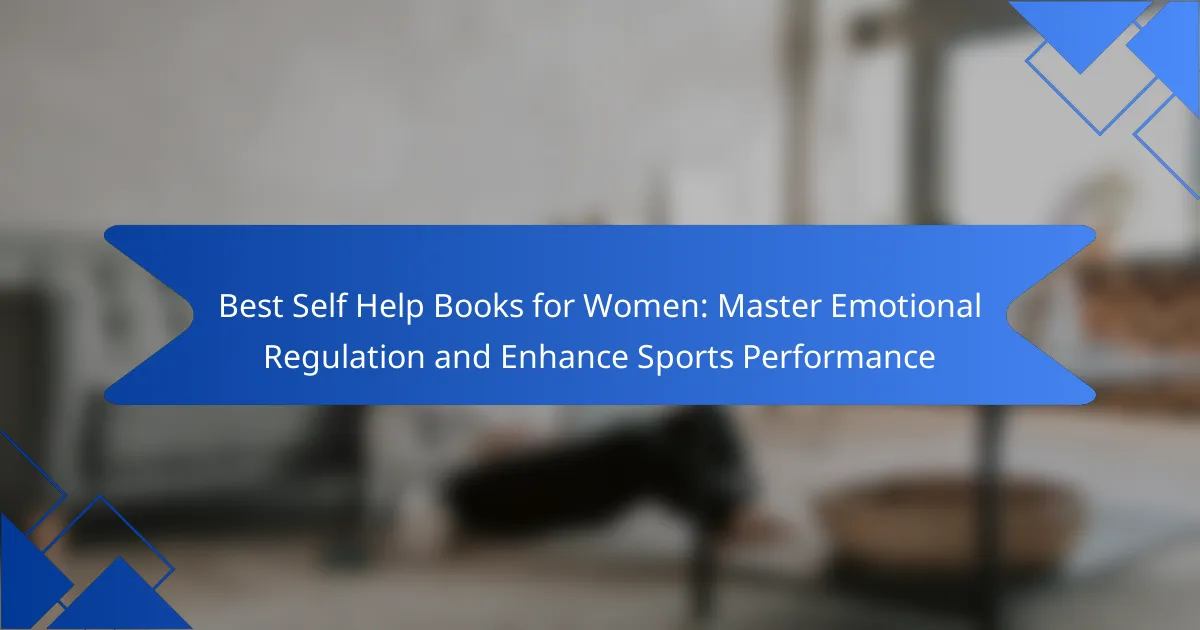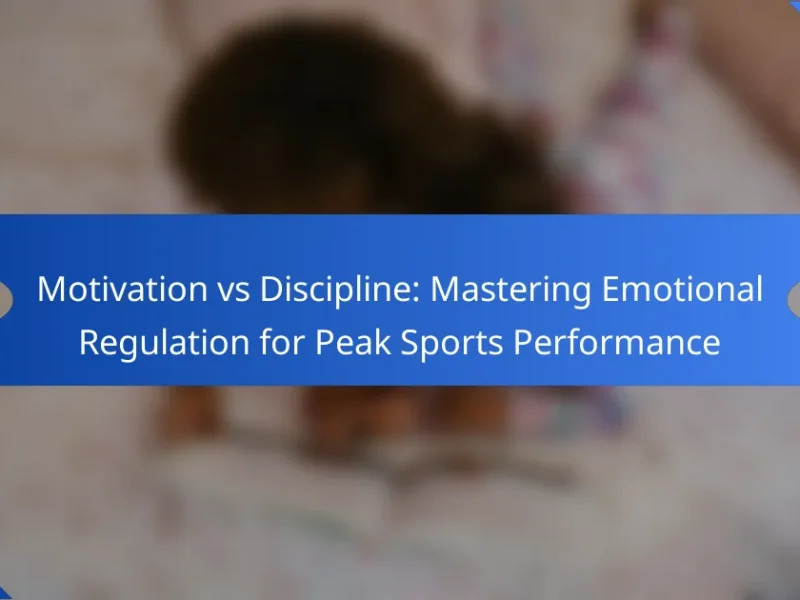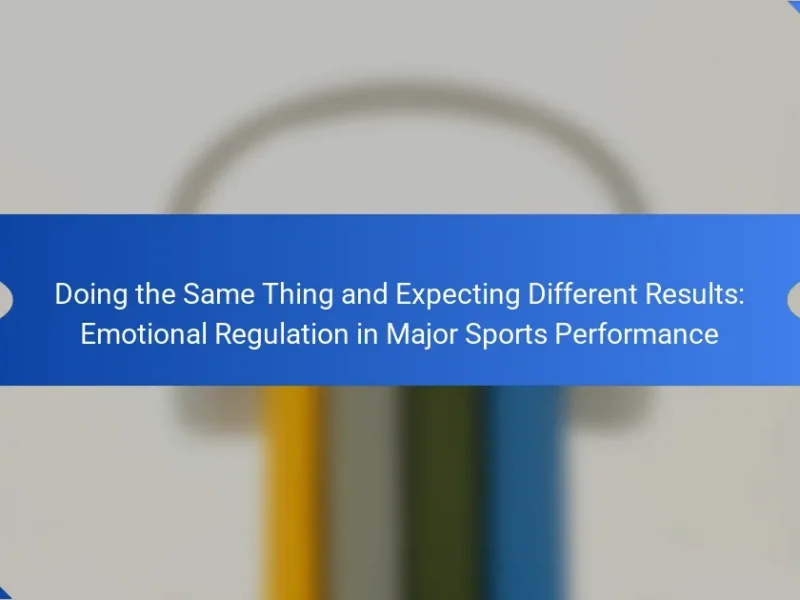Mastering emotional regulation can significantly enhance sports performance for women. This article explores the best self-help books that provide effective strategies for managing emotions. It highlights techniques like mindfulness, goal setting, and positive self-talk to improve focus and resilience. Additionally, expert tips will be shared to optimize emotional stability and performance in sports.
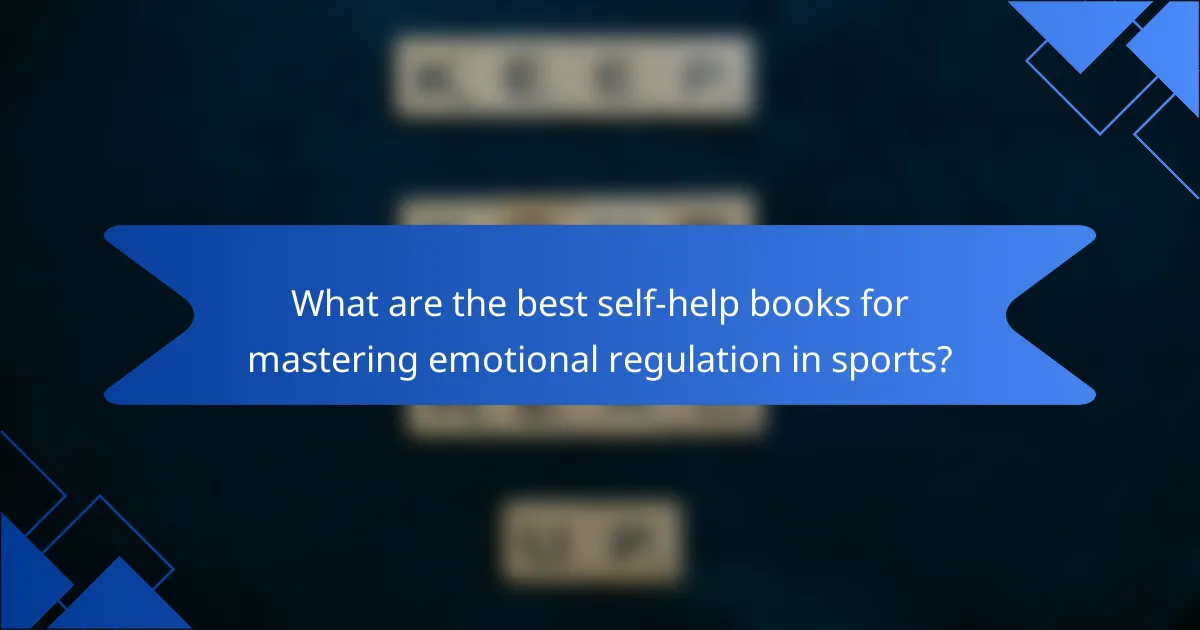
What are the best self-help books for mastering emotional regulation in sports?
“Best self-help books for mastering emotional regulation in sports include ‘The Inner Game of Tennis’ by W. Timothy Gallwey, ‘Mind Gym’ by Gary Mack, and ‘The Champion’s Mind’ by Jim Afremow. These books provide strategies to manage emotions effectively, enhancing performance.”
How do these books specifically benefit women athletes?
These books empower women athletes by enhancing emotional regulation, improving focus, and building resilience. They provide strategies to manage stress and anxiety, which are crucial for optimal performance. Additionally, they foster a sense of community and shared experiences among female athletes, promoting confidence and motivation. By addressing unique challenges faced by women in sports, these resources support personal growth and athletic success.
What universal principles of emotional regulation do these books cover?
These books cover universal principles of emotional regulation, including self-awareness, impulse control, and stress management. They emphasize recognizing emotions, understanding triggers, and employing coping strategies. Techniques such as mindfulness and cognitive restructuring are commonly discussed. Each principle aids in enhancing emotional resilience and improving overall sports performance.
What techniques are commonly recommended for emotional control?
Common techniques for emotional control include mindfulness meditation, cognitive restructuring, and deep breathing exercises. These methods help individuals manage their emotions effectively, leading to improved emotional regulation and enhanced sports performance. Mindfulness meditation increases self-awareness, cognitive restructuring challenges negative thoughts, and deep breathing promotes relaxation. Incorporating these techniques can significantly benefit women seeking to master emotional regulation in their lives.
How do these principles enhance sports performance?
Self-help principles enhance sports performance by promoting emotional regulation, focus, and resilience. These attributes lead to improved decision-making and stress management during competitions. For example, techniques from top self-help books help athletes maintain composure under pressure, ultimately boosting their performance outcomes. The unique attribute of emotional intelligence, cultivated through these readings, allows athletes to better understand their emotions and those of others, fostering teamwork and collaboration.
What unique insights do these books offer for emotional regulation?
These books provide unique insights by combining emotional regulation techniques with sports performance strategies. They emphasize self-awareness, resilience, and mindfulness, enabling women to manage emotions effectively. Techniques such as visualization and cognitive restructuring are highlighted, enhancing both emotional stability and athletic performance. Additionally, these resources often incorporate personal stories, fostering relatability and motivation.
Which authors are recognized for their expertise in sports psychology?
Top authors recognized for their expertise in sports psychology include Michael Gervais, Jim Afremow, and Daniel Gould. Their works focus on enhancing mental performance and emotional regulation in athletes. Gervais emphasizes mindfulness, Afremow highlights confidence-building strategies, and Gould explores the psychological aspects of sports training. These authors contribute significantly to self-help literature for women aiming to master emotional regulation and enhance sports performance.
What case studies or real-life examples are included?
Several case studies and real-life examples illustrate the effectiveness of self-help books for women in mastering emotional regulation and enhancing sports performance. For instance, “The Gifts of Imperfection” by Brené Brown has helped numerous women embrace vulnerability, leading to improved mental resilience in competitive environments. Similarly, “Mindset: The New Psychology of Success” by Carol S. Dweck has been adopted by female athletes to cultivate a growth mindset, significantly enhancing their performance outcomes. Additionally, “The Confidence Code” by Katty Kay and Claire Shipman provides actionable strategies that have empowered women in sports to overcome self-doubt and achieve their goals. These examples demonstrate how these books contribute to personal development and athletic success.
What rare but impactful strategies are suggested for emotional resilience?
Reading self-help books can enhance emotional resilience through unique strategies. Notable titles emphasize mindfulness, cognitive restructuring, and self-compassion. These methods encourage women to understand emotional triggers and develop coping mechanisms. For example, “The Gifts of Imperfection” by Brené Brown promotes vulnerability as a strength, fostering emotional growth. Engaging with these resources can lead to impactful changes in emotional regulation and sports performance.
How can visualization techniques improve emotional regulation?
Visualization techniques significantly enhance emotional regulation by fostering self-awareness and promoting positive emotional states. These techniques empower individuals to manage stress and anxiety effectively. Research indicates that visualization can reduce emotional reactivity and improve coping strategies, leading to better performance in sports. By mentally rehearsing scenarios, athletes can build confidence and focus, which directly impacts their emotional control during competition. Incorporating visualization practices into self-help strategies is essential for women aiming to master emotional regulation and enhance sports performance.
What role does self-compassion play in performance enhancement?
Self-compassion significantly enhances performance by fostering resilience and reducing anxiety. It encourages athletes to embrace mistakes as learning opportunities, thereby improving emotional regulation. Research shows that self-compassionate individuals exhibit higher motivation and lower levels of burnout, leading to sustained sports performance. By integrating self-compassion into training, women can master emotional regulation and enhance their overall athletic capabilities.
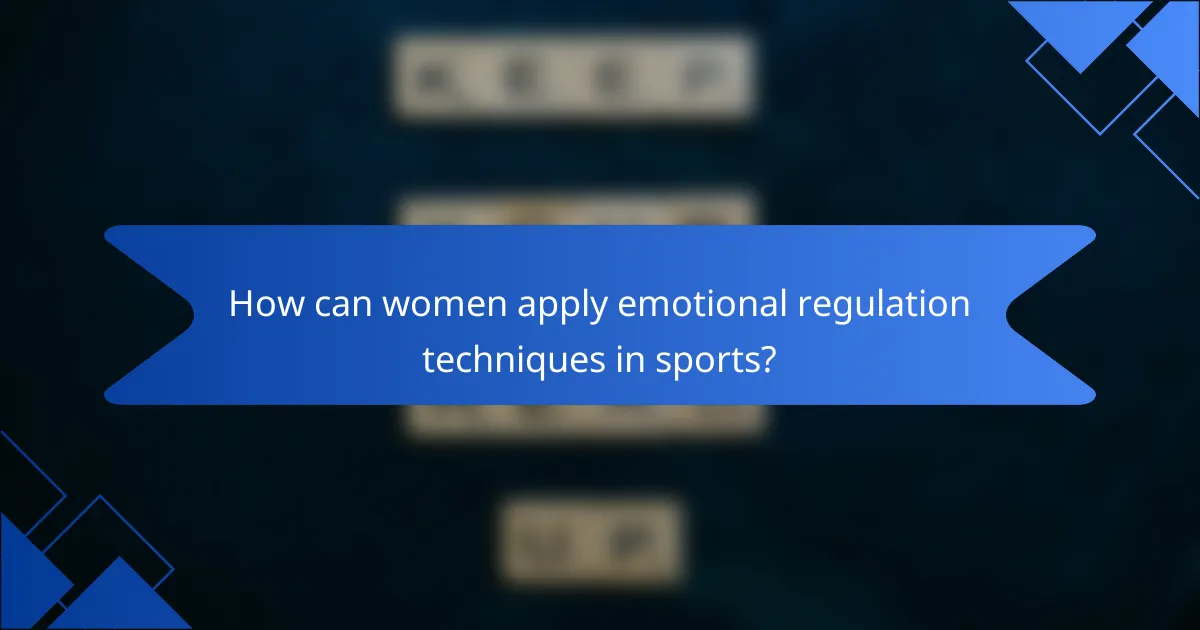
How can women apply emotional regulation techniques in sports?
Women can apply emotional regulation techniques in sports by practicing mindfulness, setting realistic goals, and utilizing positive self-talk. These strategies enhance focus and performance while managing stress effectively. Mindfulness techniques, such as breathing exercises, help maintain composure under pressure. Setting realistic goals fosters motivation and provides a clear path to success. Positive self-talk reinforces confidence and combats negative thoughts. Integrating these methods leads to improved emotional resilience and overall sports performance.
What daily practices can enhance emotional awareness?
Daily practices that enhance emotional awareness include mindfulness meditation, journaling, and regular physical activity. Mindfulness meditation fosters present-moment awareness, helping individuals recognize their emotional states. Journaling allows for reflection on feelings and experiences, promoting deeper understanding. Regular physical activity, particularly in sports, can improve mood and emotional regulation. These practices collectively support the mastery of emotional regulation, particularly beneficial for women seeking to enhance performance in various aspects of life.
How can goal-setting influence emotional regulation?
Goal-setting significantly enhances emotional regulation by providing structure and motivation. It helps individuals identify their emotions and manage stress effectively. Research shows that setting specific, measurable goals leads to improved focus and resilience. This process fosters self-awareness, enabling women to navigate emotional challenges in sports and daily life.
What are the common mistakes to avoid in emotional regulation?
To master emotional regulation, avoid common mistakes such as suppressing emotions, overgeneralizing, and neglecting self-care. These pitfalls hinder emotional awareness and resilience. Recognizing emotions is essential for effective regulation. Emphasizing self-compassion and utilizing mindfulness techniques can enhance emotional control and sports performance.
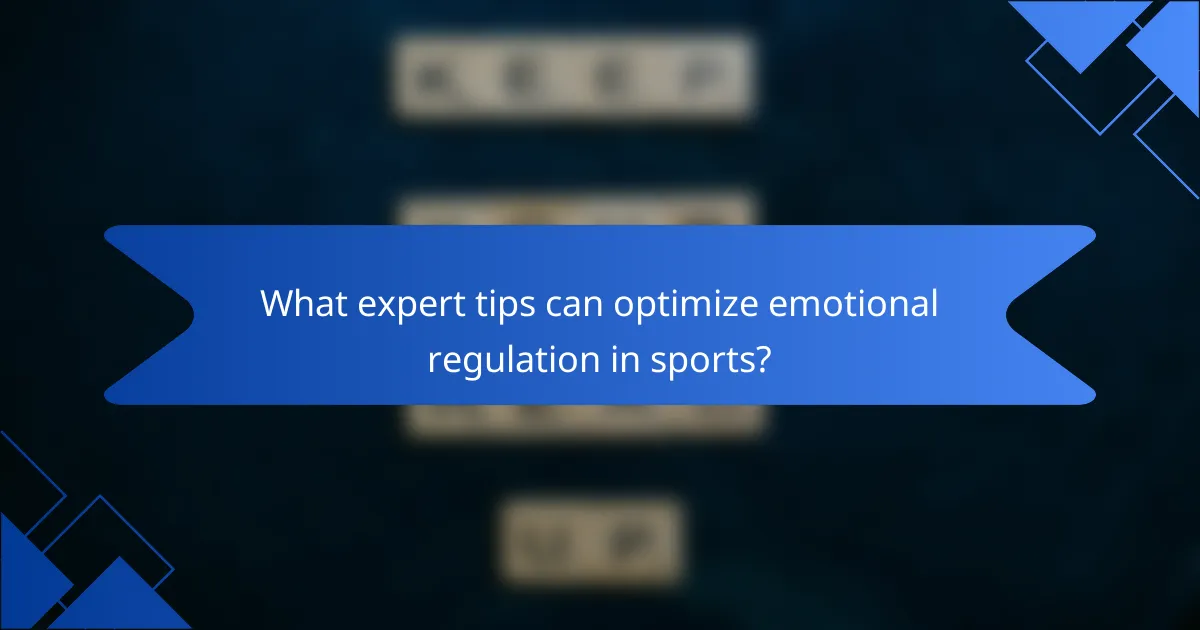
What expert tips can optimize emotional regulation in sports?
To optimize emotional regulation in sports, consider these expert tips. First, practice mindfulness techniques to enhance focus and awareness. Second, engage in regular physical activity, which can improve mood and reduce anxiety. Third, utilize visualization strategies to mentally prepare for competitions. Fourth, maintain a balanced diet to support emotional stability. Finally, read self-help books that specifically address emotional regulation for women, as they offer tailored strategies to enhance sports performance.
How can feedback loops improve emotional responses during competitions?
Feedback loops can significantly enhance emotional responses during competitions by promoting self-awareness and adaptive strategies. By incorporating regular feedback, athletes can identify emotional triggers and adjust their responses, leading to improved focus and performance. Studies show that consistent feedback fosters resilience, allowing competitors to manage stress effectively. Additionally, self-help books for women often emphasize emotional regulation techniques that can be applied in competitive settings, reinforcing the importance of feedback in personal development.
What are the best practices for integrating these books into training routines?
To effectively integrate self-help books into training routines, focus on applying their principles consistently. Start by selecting books that specifically address emotional regulation and sports performance. Schedule dedicated reading sessions alongside training to reinforce concepts. Implement practical exercises from the books during workouts to solidify learning. Track progress and reflect on personal experiences related to the material. This approach promotes sustained engagement and enhances both emotional resilience and athletic performance.
What resources are available for ongoing emotional support?
Self-help books provide ongoing emotional support by offering strategies for emotional regulation and enhancing performance. Recommended titles include “The Gifts of Imperfection” by Brené Brown, which promotes self-acceptance, and “Mindset” by Carol S. Dweck, focusing on growth mindset principles. Additionally, “The Body Keeps the Score” by Bessel van der Kolk explores trauma’s impact on emotions. These resources empower women to manage emotions effectively and improve sports performance through actionable insights and relatable experiences.
